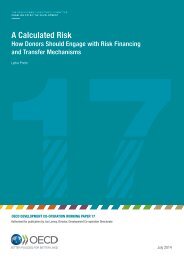UNIVERSITY
Livelihood_resilience_working_paper22
Livelihood_resilience_working_paper22
You also want an ePaper? Increase the reach of your titles
YUMPU automatically turns print PDFs into web optimized ePapers that Google loves.
Recommendation 6: <br />
Build robust methods and big datasets for research in support of resilient livelihoods xlviii <br />
Innovative methodological approaches, used to understand and track livelihood resilience, can <br />
improve the ability to design effective policy interventions, supporting the transition towards <br />
enhanced livelihood resilience. <br />
Delivering improved outcomes for livelihood resilience requires systematic approaches to big-‐data <br />
collection and monitoring and evaluation of social and ecological processes. Such approaches should <br />
be based on in-‐depth qualitative investigation and quantitative numerical data on key processes. The <br />
two types of data should complement and validate each other to provide a more comprehensive <br />
understanding of livelihoods and opportunities to enhance resilience. Such data should be context-specific,<br />
capturing and utilising local and indigenous knowledge, and might be co-‐produced with <br />
stakeholders in order to identify local constraints, potentials and opportunities.<br />
Making livelihood resilience operational requires fresh data, tailored to identify key processes for <br />
understanding livelihood resilience to environmental and socio-‐economic variability, change and <br />
shocks. The systematic construction of long-‐term databases has the potential to facilitate <br />
comparative assessments at various scales, from local to regional to global, and for monthly to <br />
decadal time series. Fresh data will also permit the exploration of non-‐linear dynamics and <br />
‘surprises.’ Advancing empirical research beyond simple linear correlations can provide new insights <br />
into tipping points, attributions of causality and triggers for transformation affecting vulnerable <br />
populations.<br />
These considerations need to be embedded within the broader context of new and emerging <br />
methodologies and technologies. The collection and processing of large amounts of data would <br />
benefit from enhanced data sharing across agencies to minimize redundancies in data collection, <br />
streamline priority monitoring and help ensure data that is of comparable form and quality. <br />
The analysis, capture, and organization of such large and complex data sets will require greater <br />
engagement with the privacy and ethical implications of data usage for research, policy-‐ and <br />
decision-‐making. <br />
xlviii This recommendation was originally drafted by Nick Cradock-‐Henry, Diana Sietz, Frank Thomalla, Ashiqur Rahman and <br />
Kees van der Geest during the second Resilience Academy and subsequently edited by Sonja Ayeb-‐Karlsson, Thomas <br />
Tanner, Kees van der Geest and Koko Warner who take full responsibility for the content.



